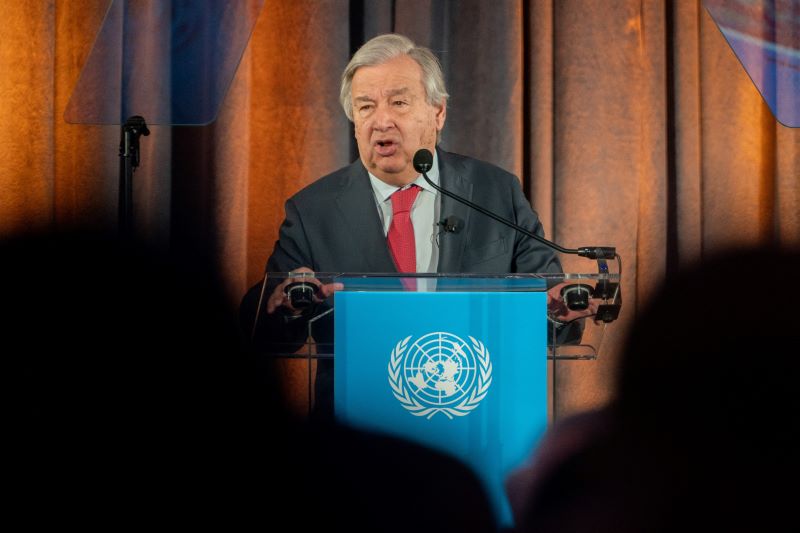The head of the United Nations, António Guterres, has for the first time called on governments to ban fossil fuel companies from advertising, as many have already done with the tobacco industry.
In a speech to mark World Environment Day at the American Museum of Natural History in Washington DC, he said that “many in the fossil fuel industry have shamelessly greenwashed, even as they have sought to delay climate action – with lobbying, legal threats and massive ad campaigns”.
“I urge every country to ban advertising from fossil fuel companies,” he said on Wednesday, adding that many governments already ban or restrict tobacco advertising – and that “some are now doing the same with fossil fuels”.
In 2022, France banned adverts for some fossil fuel products, and similar laws are being discussed in Canada and Ireland. The Dutch city of Amsterdam has banned fossil fuel adverts and the Scottish capital Edinburgh is set to do the same.
Guterres described the fossil fuel industry as “the Godfathers of climate chaos”, raking in record profits and feasting off trillions in taxpayer-funded subsidies. Meanwhile the oil and gas industry last year invested “a measly 2.5 percent” of its total capital spending on clean energy, he added.
“Mad Men fuelling madness”
The UN Secretary-General said fossil fuel companies “have been aided and abetted by advertising and [public relations] companies, Mad Men – remember the TV series – fuelling the madness”.
He called on them to “stop acting as enablers to planetary destruction” by refusing new fossil fuel clients and setting out plans to drop existing ones.
According to sector campaign group Clean Creatives, nearly 300 advertising and PR agencies held contracts with fossil fuel firms between 2022 and 2023.
Subsidiaries of the British company WPP had the highest number of fossil fuel contracts – 55 – despite having a pledge to reach net zero by 2030. Their clients include oil and gas giants Saudi Aramco, Equinor and BP.
On the other hand, more than 1,100 organisations in advertising and publicity have pledged to cut ties with fossil fuel companies and decline any contracts with them in future.
Clean Creatives executive director Duncan Meisel said Guterres’ speech was “a turning point in the advertising and PR industry’s relationship with climate change and fossil fuels”.
“There is no longer any cover for agencies to say that they are doing the right thing when working with polluters,” he said. “Everyone knows this is wrong, and everyone needs to act.”
Don’t take ads
Guterres also said that news media and technology companies should stop taking fossil fuel advertising.
Internal documents from fossil fuel firms like BP have shown that they consider placing sponsored content in the news media as a deliberate and effective strategy for influencing both public opinion and energy policy.
Research by investigative website DeSmog and Drilled showed that in-house advertising teams at international media outlets like Reuters, Bloomberg, The Financial Times and The New York Times facilitated this strategy, by promoting fossil fuel companies’ messaging through sponsored content like podcasts, newsletters and videos.
In April, The Financial Times and Reuters pulled content sponsored by Saudi Aramco that showcased the state-run oil company’s preference for technologies like hydrogen and carbon capture and storage.
DC political journalism is drowning in oil.@PunchbowlNews presented by @Chevron @axios Generate sponsored by @Chevron@politico Power Switch presented by @bp_America pic.twitter.com/9XfD3ifO7y
— Brad Johnson SUBSCRIBE TO HILLHEAT.NEWS (@climatebrad) November 13, 2023
As well as sponsoring content, fossil fuel companies take out regular adverts in mainstream and specialist media. For example, Chevron sponsors Politico’s energy podcast.
Meta, the company that owns Facebook and Instagram, received around $4 million from fossil fuel firms in return for running adverts spreading false claims over the COP27 climate summit in Egypt, according to research from Climate Action Against Disinformation.
Hottest May ever
Guterres’ speech was scheduled to coincide with World Environment Day on June 5 – also the day, he pointed out, that May 2024 was confirmed as the hottest May in recorded history
“This marks twelve straight months of the hottest months ever,” the UN chief said. “For the past year, every turn of the calendar has turned up the heat. Our planet is trying to tell us something. But we don’t seem to be listening.”
On the same day, the World Meteorological Organization (WMO) said there is an 80% chance that one of the next five years will be 1.5C hotter than pre-industrial times. In 2015, that chance was estimated at close to zero.
In the Paris Agreement adopted that year, all governments agreed to strive to limit global temperature increase to 1.5C “recognising that this would significantly reduce the risks and impacts of climate change”.
Mexico elects a climate scientist as president – but will politics temper her green ambition?
“WMO is sounding the alarm that we will be exceeding the 1.5C level on a temporary basis with increasing frequency,” WMO Deputy Secretary-General Ko Barrett said in a statement on Wednesday.
“However, it is important to stress that temporary breaches do not mean that the 1.5C goal is permanently lost because this refers to long-term warming over decades,” she added.
The WMO also said there is a close to 50% likelihood that the global temperature averaged over the five years from 2024-2028 will exceed 1.5C above the pre-industrial era.
The UN decided to combine its scientific and advocacy powers on World Environment Day in a bid to push climate change back up the global political agenda, which has been dominated by conflicts and major elections this year.
The aim is to increase pressure on the richest nations ahead of the G7 summit this month – and on all governments tasked with preparing new climate action plans – to urgently step up their efforts to cut emissions.
“The battle for 1.5 degrees will be won or lost in the 2020s – under the watch of leaders today”, said Guterres.
(Reporting by Joe Lo and Daisy Clague; editing by Megan Rowling)
